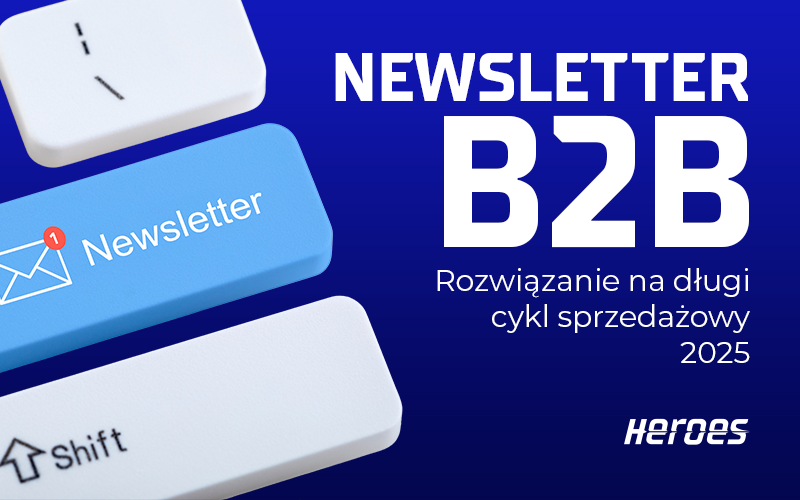A newsletter in B2B is much more than sending promotions once a week. When your sales cycle lasts from a month to a year, and customers don't need your service all the time, a newsletter becomes a strategic lifeline with potential customers. I'll show you how to build a system that will attract the right people, keep them in touch for a long time, and make them think of you first when the need arises.
Why doesn't the standard approach to B2B leads work?
In B2B, we often encounter a situation where a customer has a great product or service, but there's one problem. customer doesn't need it all year round. The need arises at a specific moment: when he gets a budget, plans changes or launches a new project.
A good example are consulting/specialist firms with a minimum project of 20k+. Great margin, but consulting is not something a company orders every month.
What do companies usually do?
Most companies in this situation:
- Waiting for inquiries
- Uses Google Ads in an attempt to "hunt down" the customer at the moment of need
- It generates a lot of contacts, most of whom are not ready to buy "here and now."
- It loses potential customers, because by the time they are ready, they have long forgotten about the company
That's why the standard approach to leads simply doesn't work.
Newsletter as a "Content Lifeline" with the customer
Instead of focusing on the "here and now," you need to build a system that:
- It will attract the right people - Decision makers from companies that are your actual target audience
- Will keep in touch for a long time - regularly providing value
- Will provide top-of-mind awareness - when the need arises, they will think of you first
Key: I'm not talking about a typical "sign up for a newsletter." I'm talking about a strategic B2B relationship-building platform.
Case Study: how the newsletter increased the quality of leads by 80%
Let's go back to the research agency example. Here's what we did:
Step 1: Identify the target audience
We identified key departments and positions that initiate research projects. We knew that these individuals needed a constant supply of industry knowledge.
Step 2: Change the approach to the campaign
We created an advertising campaign, but we did not direct to the contact form. Instead, we offered a regular industry newsletter.
Key: We immediately communicated that it was a newsletter. No "download the e-book" or "subscribe to the list."
Results after 6 months:
- Quality of leads increased dramatically - More than 80% saved from company email addresses
- Openability: 45-55% (well above the industry average)
- 600 contacts - More than half are decision makers from ideal target companies
- Zero expenditure on webinar promotion - we used a ready-made, warm base
- 10% conversion to webinar from the newsletter database
How to build a strategic B2B newsletter step by step
Step 1: Content planning
Don't do it chaotically. Conduct one large workshop where:
- Write out all possible topics
- You group them into logical paths
- You will plan the first quarter
Step 2: Establish the creation process
Standard flow:
- Brief
- Interview with an expert (if needed)
- Content creation by a copywriter
- Substantive verification
- Proofreading and formatting
Step 3: Frequency selection
After testing, we chose monthly model. Why?
- With more quality content, once a month is enough to build relationships
- Not too often, so as not to tire out the recipient
- Gives time to prepare really valuable material
4 proven content formats for B2B newsletters
1. industry trends and analysis
- What is changing in the market?
- What new methodologies are emerging?
- How are customer needs changing?
2. FAQ - Frequently Asked Questions
- Dispelling common doubts
- Explaining processes
- Showing good practices
3. case studies
- Anonymous, but specific
- With measurable results
- With conclusions straightforward to apply
4 Practical Tips
- How to plan projects?
- What to look out for?
- What mistakes to avoid?
Important: Focus not on the correlation of the content to your service, but on what these people actually need in their position.
The most common pitfalls in a B2B newsletter strategy
Trap 1: Decline in content quality
This is the biggest newsletter killer. It is better to send one great newsletter per quarter than four weak ones in a month.
Trap 2: Lack of consistency
A newsletter is not a sprint, it's a marathon. You must be prepared to deliver value on a regular basis.
Trap 3: Selling too aggressively
The newsletter is to build a relationship and an expert image. Sales will come naturally.
A practical example: why value is key
During a consultation with one of my clients, I asked a simple question, "Is this something you guys would like to read?" The answer was negative, even though they themselves were passionate about the industry and wanted to send to such enthusiasts.
Conclusion: We often fall into the pattern of "what should be sent" instead of focusing on what is really useful or super interesting from the perspective of the recipient.
Long-term benefits of B2B newsletter strategy
After several months of guidance:
- You are building a large base of committed people - quality alone, not quantity
- Zero spending on promoting more activities - you have a ready-made, warm base
- Significantly higher conversion - Recipients already got value from you
- Top-of-mind awareness - when the need arises, they think of you
Key Success Indicators:
- Openability above 40% - indicates the quality of the base and content
- Corporate email addresses above 70% - guarantee that you are reaching decision makers
- Conversion to further activities 8-15% - well above cold traffic
FAQ - the most common questions about B2B newsletters.
How often to send a newsletter in B2B?
Optimally, once a month. This gives you time to prepare valuable content without tiring your audience.
How do you measure the effectiveness of a B2B newsletter?
Key metrics are: open rate (target: >40%), quality of the base (company emails >70%), conversion to follow-up (8-15%).
How do you get the first people for your B2B newsletter?
Use paid advertising campaigns that direct to newsletter sign-ups, not lead magnets or contact forms.
What to do when newsletter engagement drops?
Go back to basics - ask yourself if the content is really valuable to the audience. Conduct a short survey of your subscribers.
Can a B2B newsletter replace other marketing efforts?
No, it's part of a long-term strategy. The newsletter builds relationships, but you also need conversion activities like webinars or meetings.
Key findings: newsletter as the foundation of B2B strategy
Key principles:
- Patience - It's not a tactic for quick leads, it's a long-term strategy
- Quality over quantity - better 200 committed recipients than 2,000 casual ones
- Systematicity - newsletter is a commitment you must fulfill
- First value - focus on the needs of the recipient, not the sale
Start building your long-term strategy
A newsletter in B2B is not an option - it's a necessity for companies with a long sales cycle. Regardless of the industry, sometimes you have to wait for the right customer buying moment. But when that moment comes, the one who has been present in consciousness all this time will win.

Join HeroLetter. It's our company newsletter where we share with subscribers knowledge and tools that realistically increase sales in B2B.
Welcome aboard!
You've just taken the first step to make your B2B marketing work faster, more efficiently and... with less frustration.
From now on you will receive HeroLetter - with ideas, tools and case studies that you can implement right away.
About the author
Lukasz Wisniewski - CEO of Heroes, an agency specializing in B2B lead generation. He has conducted over 750 sales calls, testing strategies on 100+ ad campaigns. At Heroes, we combine marketing with technology and automation, because we know that ad setup is only 25% of success. The rest is the sales process, automation and long-term strategy to build customer relationships.

